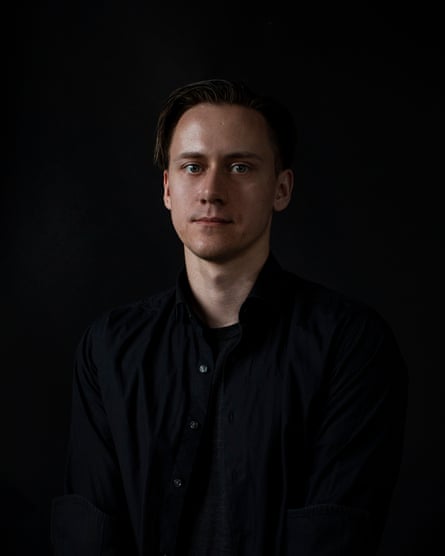The latest album by Heinali is a rather beautiful piece created from field recordings made around his home city – recordings from rail stations, the sound of traffic and birdsong, the dripping of water in a tunnel, the rumbling of trains on a track, the babble of voices in a shopping mall – all sliced up, manipulated, accompanied by synthesisers and transformed into a piece of compelling ambient music. What transforms this niche arthouse project into an urgent piece of work is the fact that the city in question is Kyiv. “These are recordings of a world that has disappeared,” says Heinali, AKA Ukrainian musician Oleh Shpudeiko. “The album documents a city that has changed for ever.”
The album, Kyiv Eternal, was completed after the Russian invasion, but the project dates back more than a decade. “I bought myself a handheld digital tape recorder in 2012 and started to record sounds around Kyiv,” says Shpudeiko. “I had hundreds of these sound sketches on my hard drive when I had to flee the city in February last year.”
He relocated to Lviv while the battle of Kyiv raged in the early months of the war, and briefly returned after the Russian army’s advances were successfully repelled. “Kyiv was more alive than ever, but I wanted to protect it from harm, to console it,” he says. “This was a city where I had spent 37 years of my life. So this album became a hymn to this part of my identity.”
Shpudeiko describes the audio loops he works with as “memory loops”. He explains: “When we remember things, we only remember certain parts. We might change parts of that memory in our brain: we’ll add or remove or amplify a piece of information. It is very similar to a musical loop. A fragment performed over and over again will change slightly with each repetition.”
Kyiv Eternal is released exactly a year after the Russian invasion, and comes not long after the release of another Heinali album, Live From a Bomb Shelter in Ukraine, which documents a performance live-streamed from a Lviv basement as Russian missiles rained down upon the nation. That album featured music from a project called Organa which he has been working on for several years, in which medieval liturgical music is reconfigured for modular synths and non-classical vocalists.
“Early music and contemporary music have a lot in common,” says Shpudeiko. “Medieval music is less about harmonic development and more about creating a certain atmosphere and a feeling. Drone and ambient music is the same. It is designed to invoke certain religious experiences, mystical experiences.”
Shpudeiko is now living temporarily in Germany, one of hundreds of Ukrainian artists relocated around Europe (thanks to the support of Ukraine’s ministry of culture) who aim to preserve and further Ukrainian art in exile. He would have loved to have come to the UK: his English is flawless, London is his favourite city and he has long been influenced by British electronic artists such as Coil, Psychic TV, Current 93 and Death in June. But the UK’s asylum policy made this almost impossible. “It is incredibly hard to get a UK visa – it costs a lot of money and British embassies demand your passport for the duration of the application process, which can take as long as three months.”
Shpudeiko was brought up in a Russian-speaking family but he rejects the myth – promulgated by Putin and his “Vatnik” apologists – that Ukraine’s Russian speakers are pro-Moscow. However, the invasion has changed his attitude towards the Russian language. “I used to read a lot in Russian. Things I wanted to read – the literature, or the books about music history or sound studies – were only available in English or Russian, never translated into Ukrainian.
“But after 24 February, I haven’t been able to read a single Russian book. I switched off that part of my brain. It was quite painful. I still speak Russian occasionally in non-official situations, like with my family, but officially I only use Ukrainian or English. I think we have all had to put Russian on pause for the duration of the war. It is extremely traumatic for any of us to deal with even the greatest Russian culture right now, knowing what they did in Bucha or Mariupol. I understand that this is not a healthy reaction, but there can be no healthy reactions to war.”
How does he see the war panning out? “I am the worst person to ask about this,” he says. “This time last year I was arguing with my girlfriend: ‘No of course there won’t be a full-scale invasion.’ Worst-case scenario was that there would be another active phase of war in the east. The Russians trying to take Kyiv seemed insane.”
Will he be touring Kyiv Eternal? “My live shows are much more improvised affairs. I’m not sure if I should ever perform this material outside of Ukraine. It is so closely connected with my home town. Maybe it can exist as a sound art installation, but it is too personal to think of doing this live.”

